Russia Used Social Media Trolls To Interfere In E.U. Elections
Evidence appears to clearly established that Russia used many of the same social media efforts it used in the United States in 2016 to interfere in the recent European Parliament elections.
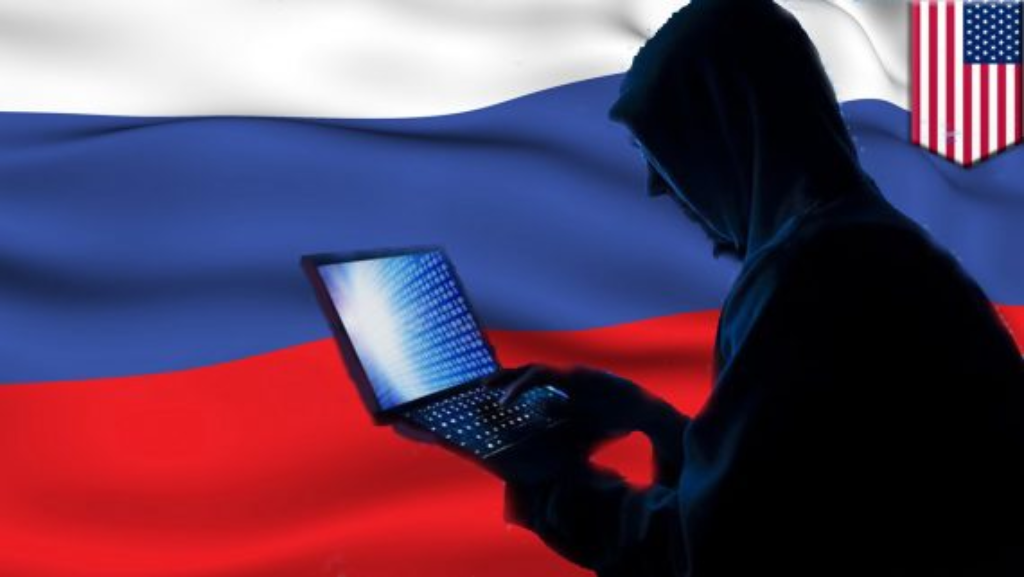
A new report indicates that Russia used the same social media trolling techniques that it used in the 2016 Presidential election to attempt to influence the recently concluded E.U. legislative elections:
LONDON — European authorities blamed Russian groups on Friday for disinformation campaigns designed to depress turnout and sway public opinion in last month’s European Union elections, an official accounting that underscored how Russian interference has not abated and that Facebook and other tech platforms remain vulnerable to meddling.
The preliminary review by the European Commission and the bloc’s foreign policy and security arm found that Russian-linked groups and other nonstate actors had worked to undermine credibility in the European Union through Facebook, Twitter and YouTube. Officials said new regulations might be needed to force internet platforms to do more to stop the spread of deliberately false information.
“The evidence collected revealed a continued and sustained disinformation activity by Russian sources aiming to suppress turnout and influence voter preferences,” the report said.
The report was the first official substantiation by the European Commission of the role that Russians and other groups played in disinformation in the May elections, which many investigators, academics and advocacy groups had warned about. It was a reminder of how active Russians and others continue to be in spreading divisive content online to inflame and stoke electorates all over the world, a strategy that the Kremlin had pioneered in the 2016 American presidential election.
Since then, Facebook, Twitter and others have vowed to clamp down on foreign interference and have worked on new technology and other methods to stop outside meddling during elections. But the report on Friday highlighted how much work the platforms still needed to do to stay a step ahead of disinformation networks. The report also has implications for American officials ahead of the 2020 presidential election, with an increasing number of smaller, harder-to-detect domestic groups adopting Russia-like strategies to influence voters.
“The genie’s out of the bottle,” said Ben Nimmo, a senior fellow at the Atlantic Council’s Digital Forensic Research Lab who has been tracking disinformation efforts in Europe. “What we’ve seen over the past few years is an increasing number of actors, both state and nonstate, using similar methods online to interfere in democratic processes.”
European officials did not draw a direct link in the report between the disinformation campaigns and the Kremlin or provide details about what groups in Russia or elsewhere were behind the efforts. The report also stopped short of assessing whether the tactics had an impact on how people voted, with turnout in the elections having hit record levels. The report largely cited the findings of outside researchers who had been tracking the European elections.
Yet European officials said the report was significant because it highlighted the “new normal” of disinformation campaigns.
“There was no Big Bang moment. There was no new Facebook-Cambridge Analytica case that we know of,” Vera Jourova, a European commissioner, said during a news conference in Brussels. Yet “the European elections were not free of disinformation.” She added that the continued online meddling was “something we cannot accept.”
(,,,)
Independent investigators had long warned that Europe was vulnerable to disinformation campaigns ahead of last month’s vote. But eradicating disinformation campaigns was tricky in the elections, which were spread across 28 countries and 24 official languages.
In the run-up to the voting, researchers highlighted efforts by Russia-linked groups and those in favor of far-right policies to use Facebook and Twitter to spread false information and exaggerate political divisions. In particular, they identified hundreds of Facebook and Twitter accounts peddling disinformation, more than a thousand examples of WhatsApp messages sharing suspicious materials and a mix of suspicious websites that spread varying degrees of misleading information — often taking advantage of local political divisions.
According to Friday’s report, Facebook blocked more than 1,700 pages, groups and accounts engaged in inauthentic behavior targeting European Union countries during the first three months of 2019. Voters in Britain, France, Germany, Italy, Poland and Spain were among those targeted. Ms. Jourova said Russian meddling had been detected in 1,000 cases since January.
In many respects, the methods that the Russians appear to have used in its efforts to interfere in the European Parliament elections are largely consistent with its past efforts. During his investigation of Russian interference in the 2016 election here in the United States, for example, Special Counsel Robert Mueller found evidence that Russian intelligence and propaganda agencies had used social media sites such as Facebook and Twitter to spread disinformation, exploit hyperpartisanship, and spread false information in a campaign that, in some cases, was playing both sides of the political aisle. It was in connection with this part of the investigation that Mueller ended up indicting a dozen Russian citizens and companies connected to the Russian government. Other reports have established efforts by Russia to interfere in the recent French elections, the recent “yellow vest” protests in France. the German elections, and the British Brexit vote. While the methods used varied from nation to nation, they have been consistent in the extent they have attempted to use social media to assist in the spread of disinformation that clearly seems to be designed to exploit existing discord over hot button issues.
The fact that the Russians have used these techniques in several Western democracies seems to suggest that the goal of this entire campaign goes beyond trying to help one candidate or the other or one side of an issue over the other. Instead, as I have suggested in the past, the goal clearly appears to be creating chaos, uncertainty, and doubt about the integrity of the democratic process:
I would suggest that there’s a far simpler, and in some ways more sinister, explanation for the goal the Russians had in 2016 and which they are likely to have in future efforts to interfere in elections in the United States or elsewhere in the world.
The evidence for this hypothesis is all around us, and it explains much of what happened over the course of the past three years or more in a far more logical way than the search for some compromising material that Putin may or may not have on Trump. The biggest indictments to date in the Russia investigation have been those handed down in February against thirteen Russian individuals and a number of companies linked to the Russian government and the second set of indictments handed down last month against a dozen members of the Russian GRU, which is Russia’s military intelligence unit. The facts alleged in these indictments make clear that the planning for the interference we know occurred in 2016 began long before Donald Trump entered the race for President, making it clear that the plan to interfere in the election was at least not initially tied to Trump’s candidacy. Instead, it appears that the entities carrying the operation out latched on to Trump’s campaign and the populist forces that gathered around it to assist in the achievement of their goal, which appears to have been to exploit the hyperpartisanship that has developed in American politics thanks largely to the rise of the Tea Party.
Judged by this standard, of course, Putin’s plan has arguably been more successful than he probably thought it would be. The past eighteen months have seen partisanship in the United States become even more bitter and divisive than it was during the Obama Era, and given the wide disparity between the way that Democrats and Independents judge the President’s performance on the job compared to Republicans, that’s only likely to continue. Indeed, public opinion on the Russia investigation itself is becoming ever more sharply divided to the point where it’s clear that most Republicans simply won’t accept Special Counsel Mueller’s conclusions no matter how much evidence there might be to support it. This will just mean more hyperpartisanship, and more division, as we head into the 2018 midterms and, beyond that, the 2020 Presidential election. Given that, one could say that Putin has already succeeded even if there is no further interference in our electoral process
The fact that the real goal of the campaign is something far more complex than simply supporting a candidate or point of view
In other words, the outcome of the election doesn’t really matter to the Russians or other nations that may be involved in such campaigns. What matters is taking advantage of the already existing hyperpartisanship and the political divide to create chaos in the targeted nation and give people like Putin something to point to when they argue that there is nothing about western representative democracy that makes it superior to the way things are done in Russia. Additionally, creating such chaos could potentially have the effect of destabilizing these countries, not so much on an existential level but to the point where decision making becomes more difficult, thus distracting them an allowing Putin to get away with whatever he may have planned. It also makes clear that future interference will be aimed less at helping specific candidates and more at exploiting our own political differences and those in other targeted nations, which was done quite successfully in 2016 and creating doubt about the legitimacy of the outcome of elections. In that regard, as I’ve said, Putin’s various campaigns have been a remarkable success and it’s unclear exactly what we can do to stop or counteract it.

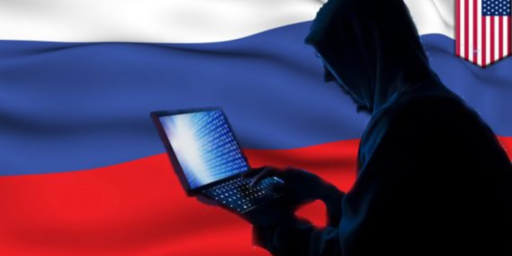
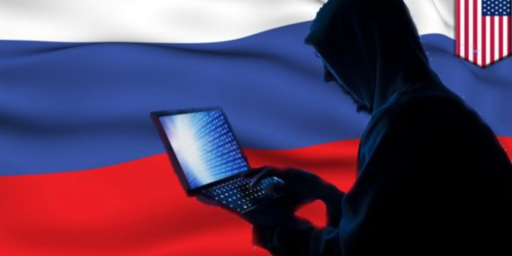

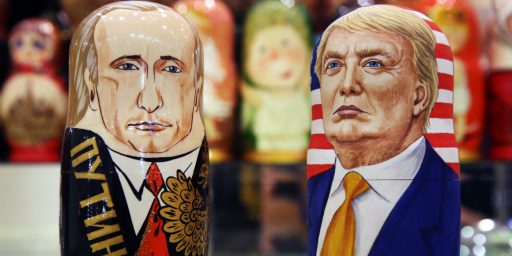
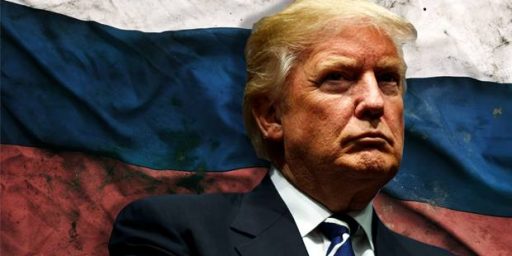
Decades ago Frederick Pohl wrote fiction about a “cool war” (I think that’s what he called it) where the various nation-state actors endlessly sabotaged each other with civilian technology and systems rather than military. It sounds like we are there….
This is my shocked face.
I remember when those of us who were on FB in the fall of 2016 were saying, hey, there’s something weird going on… and a bunch of the country, including the NYT and everyone at the WaPo except Farenthold, were all, “HA HA HA UR SO PARANOIA! TDS!”
What else is weird? How coordinated and responsive it is. I belong to an online knitting site, Ravelry, which I’ve been a member for for over ten years. It has customarily been a place for knitters to connect, find patterns, research old yarns, etc. I’ve bought and sold spinning wheels and met up with local knitters, and found boatloads of lovely patterns. This weekend Ravelry banned Trump support (not supporters) from their platform, rightfully equating support for Trump with support for white supremacy. This was the result of increased incendiary political speech on the heretofore fairly low-key forums as well as “build the wall” and Confederate flag patterns being uploaded.
Ravelry announced the decision on Twitter and on their site. Within literal minutes, their announcement thread on Twitter suddenly started to get pro-Trump comments and specious “if you don’t tolerate our intolerance, YOU’RE intolerant” replies from users with odd names like Patrick8675309 with 18 followers and JUDYMAGA with 22 followers.
Why does Russia care so much about a knitting site’s decision to ban white supremacy speech from its platform? I don’t have an answer. I just find it interesting.
There are lots of Trump supporters on Twitter with handles like PatriotRichard94635623 who post things like “I love my president best President of United States America Donald Trump! He love my US Constitution more than Joe Biden!!!” and then like 10 american flag emojis.
They seem totally legit.
Of course, when there are too many misspellings and than/then and there/their/they’re fuckups, it’s probly an actual US America Trump supporter.
I first started getting suspicious in the 2016 cycle when “Bernie Bros” would invade a thread on social media and really stir things up. There was no reasoning with them, just a lot of invective and hate. This was still during primary season.
I feel that the Russian 2016 initiative may not have been planned as Pro-Trump, but it almost certainly was planned as anti-Hillary. Putin hates her.
What this “interfere” really means? In the end, this seems to be simply “Russian agents used the Facebook to make propaganda in favor of some European political actors”. But, by this criteria, almost anything could be labelled “interference” – after all, some minutes ago I shared in one of my blogs an article about the migrant children detained in USA, and I have shared posts about Brexit, and also shared things (in blogs and in Facebook) against Bolsonaro. Could be said that I am “a Portuguese interfering in USA, British and Brazilian political process”?
I recall 6-7years ago, when there was a thread critical of Sarah Palin, her defenders would swoop in and attack.
So the real villains here are the Koch Bros, who astroturfed the Tea Party. And Republicans in general who have latched onto social division as the only way they can get elected. And it goes back at least to Nixon and the Southern Strategy.
@Miguel Madeira: Depends. Are you being paid by the Portuguese government?
When I first started noticing things like this, it involved China. Anytime I saw a critical article of China, some random American goober would show up defending China. Usually with weird syntax and just a little too much knowledge of obscure chinese culture/policy. To me it was obvious that this sort of propaganda was a thing. But the Russian version is extremely sophisticated.
@Jay L Gischer:
You may very well be right. But, in the case of Bernie Bros at least, any Russian Trolls piggybacked on top of actual bad behavior. Heck we had a fairly regular poster here, a Bernie Bro, who was right out of the gate with the Bernie Bro “Kamela Harris is a slut who sucked an old man’s d*ck to get her start in politics” messaging. Was that whole campaign started by a Russian Troll? Perhaps. But it certainly found willing dupes in the Bro community.
@Miguel Madeira:Your point is valid, but bear in mind what “trolling” originally meant: it was done by childishly malignant individuals whose sole purpose was to trigger an all caps shouting match. It wasn’t meant to prove a point or argue a case, but rather to ruin a site. And that’s what the Russians have been doing, not only on-line but IRL too. On-line we know that the RT’s have been arguing both sides of hot-button debates such as Black Lives Matter vs. Promise Keepers, trying to get everyone hotter and angrier. And IRL they have tried to drum up phony events for such groups, with both sides being unwittingly led to the same place at the same time in the hopes of real world violence. Not good.
@MarkedMan: One of the best things I ever did on social media is: anyone who was not a direct, first-hand friend, who starts Any Hillary vs. Bernie commentary in any thread for any reason gets immediately blocked. My social media has been 100% free of that junk all year.
@Teve: I took your advice when I came back from my Facebook sabbatical, started a whole new profile with a fake name/email address that my “actual” friends would instantly recognize as me, and haven’t sent friend requests to anyone who repeatedly posts shit like Guarneri does. It’s been lovely. I still get to see the people I really like, without the bullshit.
If you ever want to get freaked out about what Facebook knows about you, download your archive. I consider myself quite jaded as far as knowing how much different companies are tracking you online, but I did not realize it was that in depth. When cloning humans becomes a thing, we are going to regret putting that much information about ourselves online. Am I really dead if they can clone my physical body and use my Facebook profile to implant “memories” that might fool even my closest friends/family?